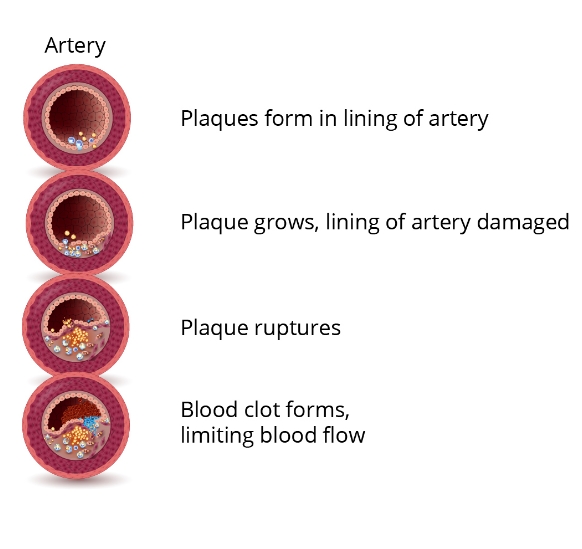GET TO KNOW YOUR HEART!
Did you know?!
An adult human heart is roughly the size of a large fist
The heart beats about 100,000 times per day (about 3 billion beats in a lifetime)
An adult heart beats about 60-80 times per minute
A baby's heart beats faster than an adult's, about 70 -190 beats per minute
The heart is located in the centre of the chest, usually pointing slightly left
Every day, the heart creates enough energy to drive a truck 20 miles. In a lifetime, that is equivalent to driving to the moon and back
Because the heart has its own electrical impulse, it can continue to beat even when separated from the body, as long as it has an adequate supply of oxygen
The 'thump-thump' of a heartbeat is the sound made by the four valves of the heart closing
WHY SHOULD WE LOOK AFTER OUR HEART?
Our heart (cardio) and our blood vessels (vascular) make up our cardiovascular system. The heart pushes a huge volume of blood to every part of our body; carrying oxygen and essential nutrients that fuel our organs, transporting vital hormones and immune cells and carrying away all the waste our body produces every second of the day.
The cardiovascular system can become sluggish and clogged if we put the wrongfuel into our body which can result in a wider range of problems and put usat risk of more serious illnesses. Just likethe cars we drive every day, our bodies are incredibly complex and thrive on a great level of care and attention. If we put low- grade fuel into it regularly and don't look after the engine, filters, suspension and onboard computer, things are going to stop functioning as they should, and the car will begin to show signst hat something is wrong. And it's the same with our body!
In England alone, cardiovascular disease (CVD) causes 1 in 4 deaths, which equates to 1 death every 4 minutes. It's also the leading cause of death worldwide. Coronary heart disease, angina, heart attacks, high blood pressure (hypertension), stroke and vascular dementia are all on the rise across the globe. And the source of most of these chronic health conditions unfortunately stems from lifestyle, diet and stress. But...the good news is that the majority of CVD is preventable!
Artery Plaques form in lining of artery Plaque grows, lining of artery damaged Plaque ruptures Blood clot forms limiting blood flow
AM I AT RISK OF GETTING CVD?
The main risk factors for CVD arise from the following three conditions:
Atrial Fibrilation - This is when our heart beats irregularly, which can cause small clots in the blood and increase the risk of stroke (a blood clot in the brain).
High Blood Pressure - Our blood pressure is a good indicator of our health, as it measures how easily blood is passing along all the vessels (tubes) in our body. When the vessels are stiff, due to a build-up of plaque inside, or the inner cells are damaged, the heart has to work harder to pump the blood around the body, and they don't relax as they should between beats. It also affects the health of other organs such as our kidneys. A good BP reading is generally below 140/90 mmHg.
High Cholesterol - cholesterol from food is transported in our blood and is vital for our body to function. However, there are 2 types of cholesterol: one 'good' and one 'bad'. It's the low-density lipoprotein (LDL) in fatty and processed foods that we need to be careful of as it builds up in the walls of your arteries, making them hard and narrow.A simple blood test can tell you your cholesterol levels.
A HEART-HEALTHY LIFESTYLE
If we take steps to look after our heart, we also look after the whole of our body! The following are ways to reduce your risk of developing CVD or maintaining your health:
Eat a diet rich in vegetables, fruit, lean protein from animals and plants, and reduce your intake of saturated fat, sugar and ultra-processed foods
Reduce the amount of salt in your diet, as this can cause a rise in blood pressure
Drink a safe level of alcohol or consider cutting it out completely if you want to give your liver a chance to repair and heal itself. Our liver filters our blood and is vital in metabolism, so needs special care
Try to give up smoking. This can contribute to the build-up of plaque in the arteries
Maintain a healthy weight for you; and move throughout the day so that your blood can pump around your whole body. Obesity is a major factor in developing CVD and puts extra pressure on our heart
Find ways to reduce stress. Chronic stress has an inflammatory effect on the whole body and can cause damage to our blood vessels which raises our BP over time
RESOURCES
If you want to learn more about the heart and CVD, here are some great resources:
1).bhf.org.uk/nutrition/heart-healthy-diet
2).heartuk.org.uk/healthy-living/introduction
3).ageuk.org.uk/7-ways-to-boost-your-heart-health
Author: Rachel Alexander - Holistic Health Coach at Mind.Body.Wisdom

SWITCH Health Hub - Keep Your Heart Healthy

First published on 700115